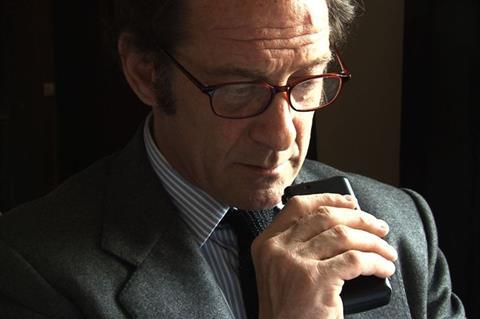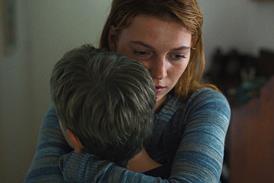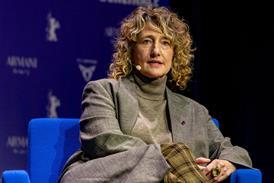Dir: Alain Cavalier. France. 2011. 105mins

Pater is arguably the ultimate two-people-in-a room film - and so is only partly as departure for veteran experimentalist Alain Cavalier, who over the last few years has proved himself France’s master of the one-main-in-a-room film. In recent work - including 2009’s superb memoir Irène, about a former partner - Cavalier has used video and strictly restricted resources to create intimate, highly crafted, seemingly off-the-cuff personal essays that are the very definition of the 100% authored cinema dreamed of by the precursors of the Nouvelle Vague.
Cavalier and Lindon add little of note in this dressing-up game for adults.
Cavalier varies his approach in Pater, in which he joins with popular actor Vincent Lindon in a sometimes comic double act that could be described variously as improvised acting exercise, political satire, quasi-documentary experiment and folie à deux. Occasionally droll and engaging, this often opaque venture ultimately disappears up its own meta-cinematic derrière, and is unlikely to appeal outside a hardcore coterie of Francophile lovers of experiment. Commercial prospects are negligible.
The film is shot on DV cameras, sometimes actually wielded on camera by either Lindon or Cavalier, or both simultaneously, at a number of locations, including the homes of both men (Lindon has a large walk-in closet that provides the only concession to spectacle). Pater begins with a lunch of canapés prepared in close-up, and Cavalier and Lindon discussing the video project they’re embarking on.
It will involve the wearing of suits and ties, which - Cavalier points out - will come out of the production budget rather than the men’s own pockets. The first in a series of role-playing exercises reveals the basic scenario: Cavalier will play the President of the Republic and Lindon his newly appointed as Prime Minister. They discuss their plans for several radical new laws, proposing for example that any elected official who steals as much as one euro from any citizen will incur maximum penalties. They then decide to pass a bill stipulating that, if there’s such a thing as a minimum wage, then there should be a maximum one too.
The film follows the two politicians’ relationship, through the rise of Lindon (or ‘Lindon’, if we’re to see him as a fictional character), through the suggestion that he might one day be President himself, through to his eventual sacking. In between, the two politicians, and/or the men who play them, swap improvised banter with a group of other actors and act out scenes from an imaginary political life: Lindon visits a bakery and listens to a barfly dispensing misogynistic repartee, and Cavalier gazes at himself in the mirror after having (genuinely, it appears) undergone cosmetic surgery to reduce his sagging dewlaps.
A seemingly free-associative structure, with Lindon’s political ‘career’ as the coherent thread, yields some lively moments: in particular, Lindon, playing up his rough-diamond charm, fulminates tetchily off the top of his head. The odd moment of outright surrealism - such as the discovery of a car spiked with pickaxes - pushes the project into the realm of video art rather than auteur cinema in the familiar sense.
Beyond the political themes, other preoccupations are (as the title suggests) the quasi-oedipal tension between the elder-statesman ‘father’ and the chosen ‘son’ or successor; and the question of how clothes maketh the man, with the cast’s demeanour and comportment partly determined by the sober formal garb they wear throughout.
Both principal participants are lively, often witty presences: Cavalier is self-mockingly, impishly punctilious, while Lindon shows that his energy can command our attention even when he’s visibly flailing for something to say (at more than one moment, he and other actors simply start corpsing). But ultimately, the film is too hit and miss - and often too slow and vague - to yield many trenchant insights. And, partly because it’s never clear at the outset exactly what kind of project Lindon and Cavalier think they’re pursuing, we can never quite gauge whether it’s successful within its own terms of reference.
Finally, little is revealed either about power politics or about the mirror game of acting and filming. This self-referential terrain has been pretty thoroughly covered in recent years by the likes of Godard, Kiarostami, Catherine Breillat (Sex is Comedy) and von Trier (in his The Five Obstructions), to name a few. Cavalier and Lindon add little of note in this dressing-up game for adults.
Production company: Camera One, Arte France Fincema
International sales: Pathé International, www.patheinternational.com
Producer Michel Seydoux
Main cast: Vincent Lindon, Alain Cavalier, Bernard Bureau, Jonathan Duong





















